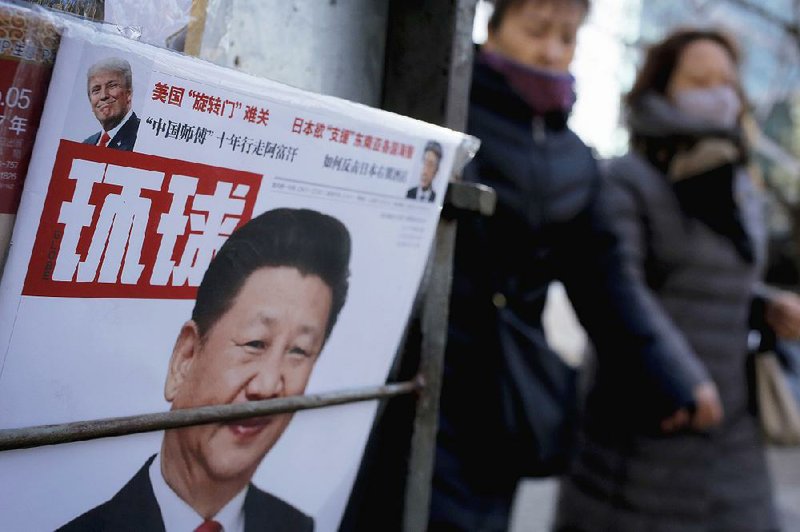WASHINGTON -- When the White House announced this week that President Donald Trump had sent President Xi Jinping of China a letter wishing him a happy Chinese New Year, it did not disclose a major reason for the friendly gesture: Xi had not, at that point, gotten on the phone with Trump.
RELATED ARTICLES
http://www.arkansas…">Judges back travel-ban freezehttp://www.arkansas…">Trump declares remarks by his court pick skewed http://www.arkansas…">White House: Trump adviser Conway 'counseled' after Ivanka pitch http://www.arkansas…">EU anti-U.S., says Trump's envoy pickhttp://www.arkansas…">Air traffic control revamp on table
That changed Thursday night, when the two leaders had what the White House described as a "lengthy conversation" during which Trump agreed to honor the "one-China" policy the president previously had refused to commit to uphold.
"The two leaders discussed numerous topics and President Trump agreed, at the request of President Xi, to honor our One China policy," the White House said in a statement released late Thursday. It said the discussion was "extremely cordial" and that the presidents "extended invitations to meet in their respective countries."
The call comes on the heels of a letter dated Wednesday that Trump sent to his Chinese counterpart saying he looks forward to developing a "constructive relationship" with Beijing.
[PRESIDENT TRUMP: Timeline, appointments, executive orders + guide to actions in first 100 days]
The letter also thanked Xi for a message he sent congratulating Trump on his inauguration and conveyed wishes to the Chinese people for the Lunar New Year, the White House said in a two-sentence statement.
Before his inauguration, Trump and his Cabinet appointees made comments and took actions that alarmed the government in Beijing and pointed to rocky ties between the world's two biggest economies.
Since his inauguration, Trump has spoken by phone with about 20 foreign leaders. Usually highly scripted affairs, many of those calls have been anything but. The president's conversation last month with Malcolm Turnbull, the prime minister of Australia, turned contentious when Turnbull urged Trump to honor an agreement made under President Barack Obama to accept 1,250 refugees from an offshore detention center.
Lu Kang, a spokesman for China's Foreign Ministry, expressed thanks for Trump's letter.
"The two countries share wide common interests, and cooperation is the only correct path for both," Lu told reporters Thursday in Beijing.
Even before the phone call to Xi, Trump and his advisers shifted their tone toward China after the inauguration.
During the campaign, Trump advocated a 45 percent tariff on Chinese exports to the United States, complaining that China manipulated the value of its currency. After his election, Trump broke decades of precedent by talking to Taiwan's leader, going so far as to say that the one China policy -- a linchpin of U.S.-China ties that recognizes a single China with Taiwan included -- was negotiable.
Last month, in his confirmation hearings, Rex Tillerson, the secretary of state, suggested that the U.S. would bar China from its artificial islands in the South China Sea.
But since the inauguration, the tone has changed, with dialogue and diplomacy replacing diatribes. Ivanka Trump, the president's elder daughter, attended a Lunar New Year celebration this month at the Chinese Embassy in Washington.
Trump's granddaughter, Arabella, sang a New Year's greeting in Mandarin that was widely viewed in China. Her father, Jared Kushner, who is a senior adviser to Trump, met with China's ambassador, Cui Tiankai, before the embassy event, part of an extensive dialogue between the two men, Bloomberg News reported.
For his part, Defense Secretary James Mattis said the United States will focus on diplomacy to help resolve disputes in the South China Sea. Michael Flynn, the national security adviser, talked by phone last week with China's top foreign-affairs official, Yang Jiechi.
"I think the letter indicates that Sino-U.S. relations should be OK," Zhang Baohui, a professor of political science at Lingnan University in Hong Kong, wrote in an email. "Kushner is said to be in charge of Trump's Israel, Mexico and China policies. His wife's visit to the Chinese Embassy and his own meeting with Cui Tiankai are signs that Trump does not want to rock the relationship."
The extensive business relationships between some of Trump's advisers and leading Chinese companies with close links to the Communist Party also may be strengthening ties. Kushner took part in talks last year with the Chinese billionaire Wu Xiaohui to help redevelop the Kushner family's crown jewel, a commercial building on Fifth Avenue, The New York Times reported.
A Section on 02/10/2017

